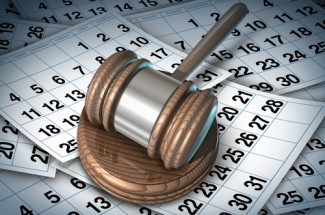Met that law school application deadline? You might be too late, AccessLex study finds

If a student from an underrepresented community applies to law school right before the deadline, then they are already late, according to a report from the AccessLex Institute released in December. Image from Shutterstock.
If a student from an underrepresented community applies to law school right before the deadline, then they are already late, according to a report from the AccessLex Institute released in December.
“You’re nearly twice as likely to get an admission offer if you apply early, essentially 40%, compared to 24%,” says Kelsey Risman, a senior evaluation methodologist at the AccessLex Institute.
Early applications are defined as those submitted before the end of November, and on-time applications are made before the beginning of February, according to Risman.
Because the majority of law schools have rolling deadlines, “the deadline is not really the deadline,” Risman says. “The deadline is just when they stop looking at things in a rolling admissions context. If you submit the day before the deadline, you might be fighting many people for one remaining slot.”
Qualitative and quantitative data was collected from 186 participants in AccessLex’s LexPreLaw pathway programs. The participants identified as being from an unrepresented racial or ethnic group with low socioeconomic status background and who applied to at least one law school for admission in fall 2022 and fall 2023.
 February is “where things start to really drop off in terms of optimal outcomes,” says Kelsey Risman. (Photo courtesy of the AccessLex Institute)
February is “where things start to really drop off in terms of optimal outcomes,” says Kelsey Risman. (Photo courtesy of the AccessLex Institute)The sample is highly representative of first-generation college students, children of immigrants and Pell Grant recipients. Two cohorts were examined in this study, which ultimately will stretch over five years, Risman says.
The Law School Admission Test is the primary driver of application timing, the study found. Applicants who took the LSAT after Jan. 1 are 63% more likely to apply late, compared to only 26% of early or on-time applicants, according to the study.
A high LSAT score is not the best predictor that a student will be applying early, according to the study.
Instead, the research found that early applicants more frequently demonstrated knowledge of the key tactics underlying an effective law school application strategy, and that those who applied late more frequently cited incomplete or inaccurate understanding of sound application strategy, including ideal timelines and submission processes.
This means that law schools are missing out on talent, Risman says.
“It’s not necessarily the smartest kids who are getting on your table to look at,” she says. “People just don’t know what to do.”
For those with lower LSAT scores who also apply late, February proves to be the danger zone.
“That’s where things start to really drop off in terms of optimal outcomes,” Risman says.
Programs that offer cash incentives for completing applications early or give access to a personal coach who walks the applicant through the process proved to be effective in encouraging applicants to apply early or on time, the study found.
“Interventions underscore the importance of actively creating equity on the cycle,” Risman says. “When people are provided with very specific targeted support, their behavior changes.”
Write a letter to the editor, share a story tip or update, or report an error.



